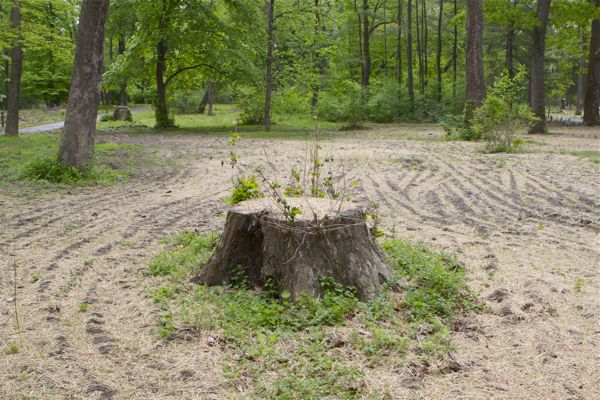Gov. Christie Asked to Veto Forest Bill – Bill Called A “Betrayal of the Public Trust”
As rhetoric ramps up, NJ Audubon – the bill’s main supporter – remains silent
Tom Johnson at NJ Spotlight has a good story today on the latest development in the increasingly polarized dispute over the proposed “forest stewardship” bill (see:
While the story is dead on accurate – and basically follows our preliminary Coroner’s report – the headline is slightly misleading.
Even DEP has emphasized that the forestry will be “selective cut”, so it is unlikely that the bill will promote what the public thinks of as massive clear cuts.
Yes, there could be clear cut patches, but they probably would not be massive (but even small patch clearing can be a disaster, like DEP’s controversial proposed clearcut of 6 acres of mature massive sycamores on Bulls Island) – a plan a prominent NJ scientist called “a travesty”).
Unfortunately, the headline may allow the sponsors and supporters to claim that opponents are exaggerating. A better term would have been “commercial logging”.
But the key policy point is put front and center – the bill would allow commercial logging on state lands that must be managed as a public trust resource, not a commercial commodity:
“We need to protect these forests and the vulnerable ecological assets they hold such as forested wetlands and vernal pools through effective stewardship, not commercial-driven management,’’ said Tracy Carluccio, deputy director of the Delaware Riverkeeper Network.
The key legislative and political point also is made very clear. NJ Spotlight got it:
The bill, which won final approval in a 46-27 vote, was endorsed by some conservation groups largely because it requires the state Department of Environmental Protection to win approval from an independent Forest Stewardship Council for any forest management plan it develops.
In a letter to lawmakers last month, however, the DEP insisted this provision is an unnecessary and costly requirement.
As we wrote, the bill’s supporters in the NJ Conservation community only reluctantly agreed to support the bill as a compromise negotiated with the bill’s sponsors and the DEP.
That compromise was based on inclusion of protective safeguards, primarily via the independent Forest Stewardship Council’s (FSC) standards, backed by the FSC certification of DEP’s statewide plan and individual forest management plans and FSC performance audits.
But, DEP has done a huge U-turn on FSC, initially supporting FSC and now rejecting it.
Here is DEP’s position on FSC, when that compromise was reached which lead to the Senate substitute bill (March 19, 2012 – source: NJ Spotlight)
“An independent third-party certification system is the best way to steward our forests,’’ said Eric Olsen, of the New Jersey Nature Conservancy. “It sets a rigorous mark for management of our forests.’’
Lynn Fleming, state forester for New Jersey, also endorsed the system and said the state is seeking additional funding to manage its woodlands from the U.S. Fish, Game and Wildlife Service.
But here is DEP current position on FSC, as of June 10, 2013 (source: DEP letter to Chairman Albano – hit this link and scroll down to read that DEP letter)
The DEP’s remaining concern would be a mandatory Forest Stewardship Council (FSC) certification required for any stewardship plans we develop … While we respect FSC and recommended incorporating the FSC standards into the legislation, this mandatory certification is an un-necessary and costly requirement. The DEP is the steward of New Jersey’s environment; we do not need our work validated by somebody else. Moreover, this unnecessary requirement adds a significant financial cost to the program, which will approach approximately $100,000 in the first year.
It is very clear that DEP opposes FSC and will not enforce FSC. So, the FSC standards, certification, and performance audits that conservation group supporters agreed to in order to support the bill are gone.
The bill does not require that DEP abide by FSC and does not require that forest and management plans comply with FSC, because to do so would require that DEP adopt regulations to mandate that forest stewardship plans comply with FSC standards, FSC certification, and FSC audits.
So, the bill has been gutted.
I have urged the bill’s supporters to reconsider their support and make a public statement (see: Open Letter to the Highlands Coalition and Other Supporters of the Forest Stewardship bill).
That has not happened.
And, perhaps worse, NJ Audubon – who is the only entity that has FSC certification in NJ and therefore an effective monopoly on the market for FSC forest certification – was closely involved with Senator Smith in initiating the idea for the bill and served as the bill’s main supporter, has decided to duck the tough issue of whether they are acting more like a self interested consultant than a conservation steward (Audubon has ongoing forestry work with NJ DEP at Sparta Mountain and with PSEG on ROW).
Even with all the criticism of the bill, it has won support from some conservation organizations, including the New Jersey Audubon Society, New Jersey Conservation, New Jersey Farm Bureau, and Pinelands Preservation Alliance.
A message to the New Jersey Audubon Society, the only organization in the state certified to produce Forest Stewardship Plans, was not returned. In the past, Bill Wolfe, an environmental advocate for the Public Employees for Environmental Trust (sic), argued there were conflicts of interest with the organization’s support of the program because it receives consulting and management fees for the program.
This is not a healthy situation and it must be resolved openly.
[BTW< the Farm Bureau is not a “conservation organization”. They represent and promote the economic interests of the ag and forestry industries.]
